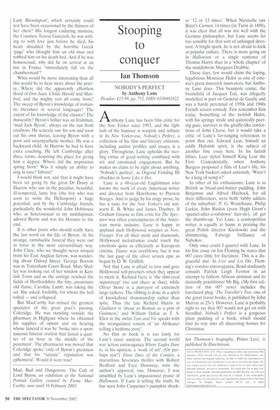Stooping to conquer
Ian Thomson
NOBODY'S PERFECT by Anthony Lane Picador, £15.99. pp. 752, ISBN 0330491822
Anthony Lane has been film critic for the New Yorker since 1993, and the light lash of his humour is waspish and urbane in its New Yorker-ese. Nobody's Perfect, a collection of his film and literary criticism, including author profiles and essays, is a glory. Throughout, Lane upholds the sterling virtue of good writing combined with wit and emotional engagement. But he makes no claim to be right about anything. 'Nobody's perfect', as Osgood Fielding III chuckles in Some Like it Hot.
Lane is a 40-year-old Englishman who knows the work of every American writer and director from Hawthorne to Preston Sturges. And to judge by his zingy prose, he has a taste for the New Yorker's old stalwarts E. B. White and James Thurber. If Graham Greene as film critic for The Spectator was often contemptuous of the American movie industry, Lane is happy to applaud such Hollywood weepies as Now, Voyager. For all their mink and diamonds, Hollywood melodramas could touch the emotions quite as efficiently as European cinema. Titanic was overblown, but it was the last gasp of the silver screen epic as begun by D. W. Griffith.
Not that Lane is afraid to toss and gore Hollywood self-preeners when they appear to merit it. Richard Gere is 'the slim-eyed supercreep' (we can cheer at that), while Oliver Stone is a purveyor of extremely large turkeys. The ribbing is done in a spirit of knockabout showmanship rather than spite. Thus the late Richard Harris in Gladiator is 'about as Roman as a pint of Guinness'; and William Dafoe as T. S. Eliot in the awful Torn and Viv speaks with the strangulated vowels of 'an Afrikaner telling a bedtime story'.
No film or book is is too lowly for Lane's razor analysis. The second world war action extravaganza Where Eagles Dare is, in his opinion, a 'work of art'. (Or perhaps not?) Three Days of the Condor, a marvellous Seventies thriller with Robert Redford and Faye Dunaway, wins the author's approval, too. However, I was unsettled by Lane's impassioned praise of Halloween, If Lane is telling the truth, he has seen John Carpenter's pumpkin shock
er '12 or 13 times'. When Nietzsche saw Bizet's Carmen 14 times (in Turin in 1888), it was clear that all was not well with the German philosopher. but Lane seems far too sensible for that sort of unhinged devotion. A bright spark, he is not afraid to look at popular culture. There is more going on in Halloween or a single sentence of Thomas Harris than in a 'whole chapter' of the middlebrow Margaret Drabble.
These days, few would claim the loping, lugubrious Monsieur Hulot as one of cinema's great maverick innovators, but Anthony Lane does. This beanpole comic, the brainchild of Jacques Tati, was allegedly modelled in part on General de Gaulle and was a hardy perennial of 1950s and 1960s French screen comedy. Few remember him today. Something of the twittish Hulot, with his springy stride and quizzically peering gaze, survives in the giraffe-like contortions of John Cleese, but it would take a critic of Lane's far-ranging references to point that out. Edward Lear, himself an oddly Hulotish spirit, is the subject of another fine essay here. In his fattish fifties, Lear styled himself King Lear the First. Coincidentally, when Anthony Burgess proposed a film of Lear's life, his New York backers asked anxiously, 'Wasn't he a king of sump'n?'
In other of his enthusiasms, Lane is as British as bread-and-butter pudding. John Betjeman and Alfred Hitchock, for all their differences, were both 'tubby addicts of the suburban'. P. G. Wodehouse, Philip Larkin, John Ruskin (even Hugh Grant's 'spaniel-after-a-rubdown' hair-do), all get the thumbs-up. Yet Lane, a cosmopolitan writer, is equally at home in praising the great Polish director Kieslowski and the shimmering, Faberge brilliance of Nabokov.
Only once could I quarrel with Lane. In his fine essay on Ian Fleming he states that 007 cares little for literature. This is a disgraceful slur. In Live and Let Die, Fleming's voodoo extravaganza, Bond studiously consults Patrick Leigh Fermor in an attempt to fathom African animism and its dastardly practitioner Mr Big. (My first edition of this 007 novel includes the barefaced plug: 'The Traveller's Tree, one of the great travel books, is published by John Murray at 25s'). However, Lane is probably right to say that 007 would not get on with Stendhal. Nobody's Perfect is a gorgeous plum pudding of a book, which should find its way into all discerning homes for Christmas.
Ian Thomson's biography, Primo Levi, is published by Hutchinson.


























































































 Previous page
Previous page